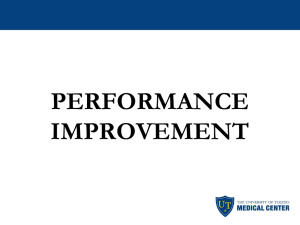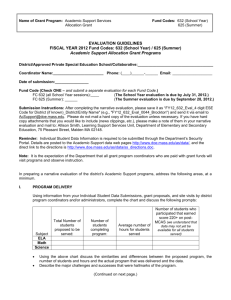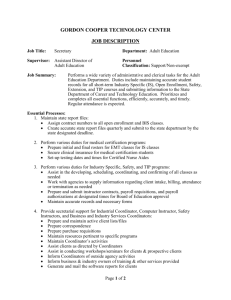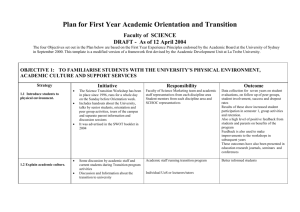Center for Public Service Assessment Summary 2008-2009
advertisement
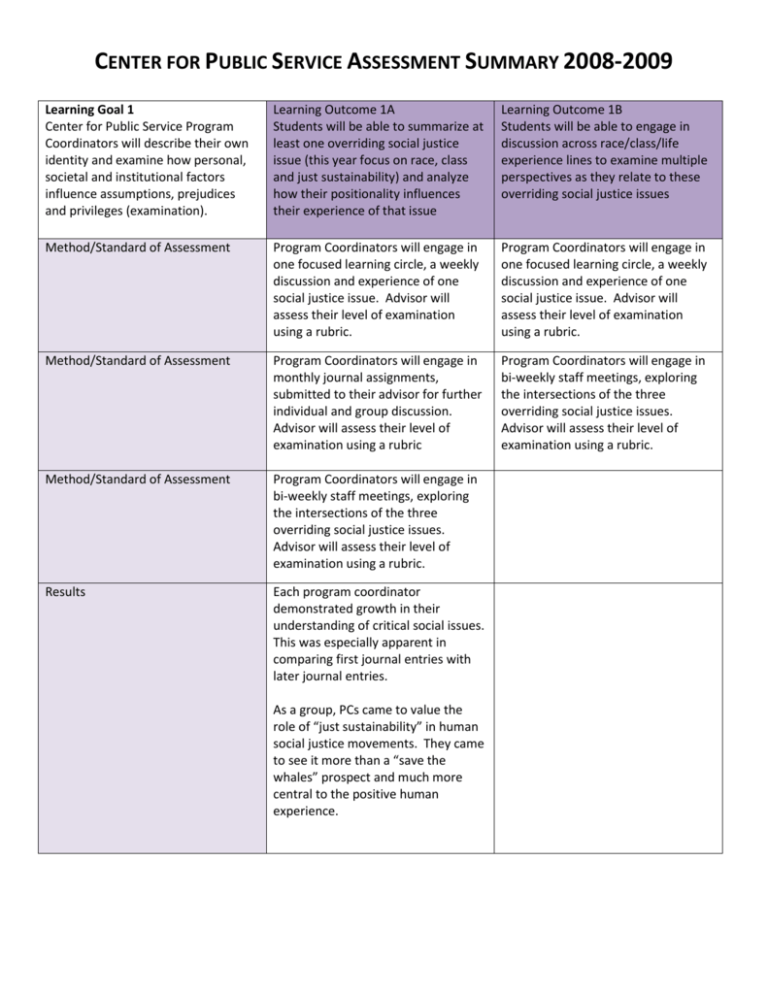
CENTER FOR PUBLIC SERVICE ASSESSMENT SUMMARY 2008-2009 Learning Goal 1 Center for Public Service Program Coordinators will describe their own identity and examine how personal, societal and institutional factors influence assumptions, prejudices and privileges (examination). Learning Outcome 1A Students will be able to summarize at least one overriding social justice issue (this year focus on race, class and just sustainability) and analyze how their positionality influences their experience of that issue Learning Outcome 1B Students will be able to engage in discussion across race/class/life experience lines to examine multiple perspectives as they relate to these overriding social justice issues Method/Standard of Assessment Program Coordinators will engage in one focused learning circle, a weekly discussion and experience of one social justice issue. Advisor will assess their level of examination using a rubric. Program Coordinators will engage in one focused learning circle, a weekly discussion and experience of one social justice issue. Advisor will assess their level of examination using a rubric. Method/Standard of Assessment Program Coordinators will engage in monthly journal assignments, submitted to their advisor for further individual and group discussion. Advisor will assess their level of examination using a rubric Program Coordinators will engage in bi-weekly staff meetings, exploring the intersections of the three overriding social justice issues. Advisor will assess their level of examination using a rubric. Method/Standard of Assessment Program Coordinators will engage in bi-weekly staff meetings, exploring the intersections of the three overriding social justice issues. Advisor will assess their level of examination using a rubric. Results Each program coordinator demonstrated growth in their understanding of critical social issues. This was especially apparent in comparing first journal entries with later journal entries. As a group, PCs came to value the role of “just sustainability” in human social justice movements. They came to see it more than a “save the whales” prospect and much more central to the positive human experience. Utilization Learning circles prove to be a useful tool to provide a space for students to think critically about difficult issues. They begin to connect their actions with community locally with broader social issues – connecting deeper intellectual understanding with ideas for action – engaging in a process. We found it useful this year for students to revisit their recorded learning/journals at long-term intervals to examine their own growth. While students, in the end, value the learning they experience through these processes, they sometimes resist the method (particularly the journal assignments on Angel). To address this, we are seeking to use Facebook, something they are consistently (obsessively) utilizing to post shorter thoughts on related issues in an “invite only” group setting. Learning Goal 2 Demonstrate the skills needed to promote positive social action Learning Outcome 2A Develop skills in working collaboratively toward a common goal Learning Outcome 2B Learn and practice group facilitation skills Method/Standard of Assessment Program Coordinators will engage in community partnerships to carry out CPS programming. Advisor will meet regularly with student and community partner to assess the relationship, with the group identifying strengths and next steps for improvement. Program Coordinators will engage in a self- and advisor-assessment of their CPS work in November to identify strengths and areas for improvement. Program coordinators will be trained in relevant group facilitation skills (training, reflection). The advisor will discuss their progress in implementing these skills through one-on-one meetings, response to written reports and through the self and advisor-assessment process. Method/Standard of Assessment Results Overall, students showed growth in their self-identified growth goals. In addition, they developed good working relationships with community partners. This was sometimes a challenge, however, as they sought to navigate different learning styles and learned not to simply place blame, but actively seek to build on multiple strengths and personalities in any given situation. Utilization We are revising the community partner/student leadership workshop this fall so that the community and student partners work together to develop action plans that intentionally and simultaneously encourage student learning while meeting community identified goals for change/action. Learning Goal 3 Program coordinators will identify and practice the role they play in their various communities. Learning Outcome 3A Program Coordinators will understand their own strengths and contributions to a greater community Method/Standard of Assessment Program Coordinators will write a statement of purpose at the end of Fall Training, examining their goals for community engagement during the coming academic year. The advisor will discuss this document with each PC individually and in group meetings (as appropriate), using a rubric to assess the students’ understanding and gradually deepen it throughout the year. Method/Standard of Assessment Program Coordinators will compile a collection of their reflections and reports at the end of the academic year, prefacing them with a revised statement of purpose for carrying forward their CPS and community experience. The advisor will assess student progress over the year using a rubric. Results Each program coordinator demonstrated growth in their understanding of critical social issues. This was especially apparent in comparing first journal entries with Opportunities for deep reflection and social issue discussion (such as through learning circles) need to be made available to the broader volunteer body. We are working to make those opportunities available gradually over the next year through expanded learning circles, etc. Learning Outcome 3B Program Coordinators will serve as an advocate for (a) social justice issue(s) and/or their community partner on campus. Program Coordinators will engage in multiple forms of promoting community engagement (email, oneto-one discussions, group discussions, campus programming, etc.). Advisor will review these activities with the student through group meetings, oneto-one discussions, self-assessments, etc., assessing their effectiveness with a rubric. later journal entries. Utilization Learning circles prove to be a useful tool to provide a space for students to think critically about difficult issues. They begin to connect their actions with community locally with broader social issues – connecting deeper intellectual understanding with ideas for action – engaging in a process. We found it useful this year for students to revisit their recorded learning/journals at long-term intervals to examine their own growth. While students, in the end, value the learning they experience through these processes, they sometimes resist the method (particularly the journal assignments on Angel). To address this, we are seeking to use Facebook, something they are consistently (obsessively) utilizing to post shorter thoughts on related issues in an “invite only” group setting.
